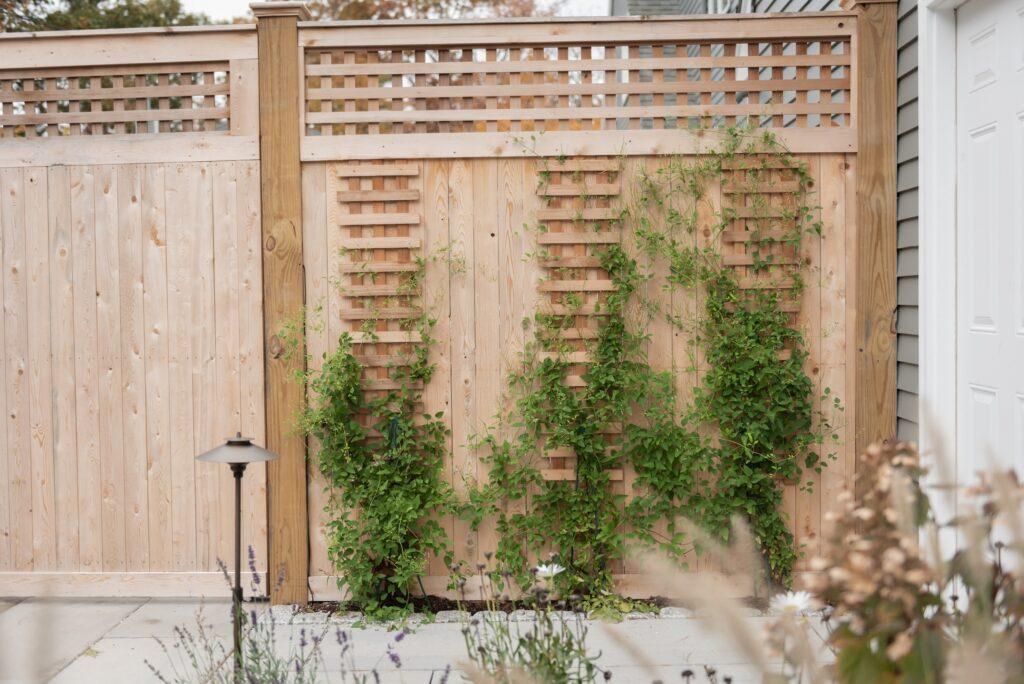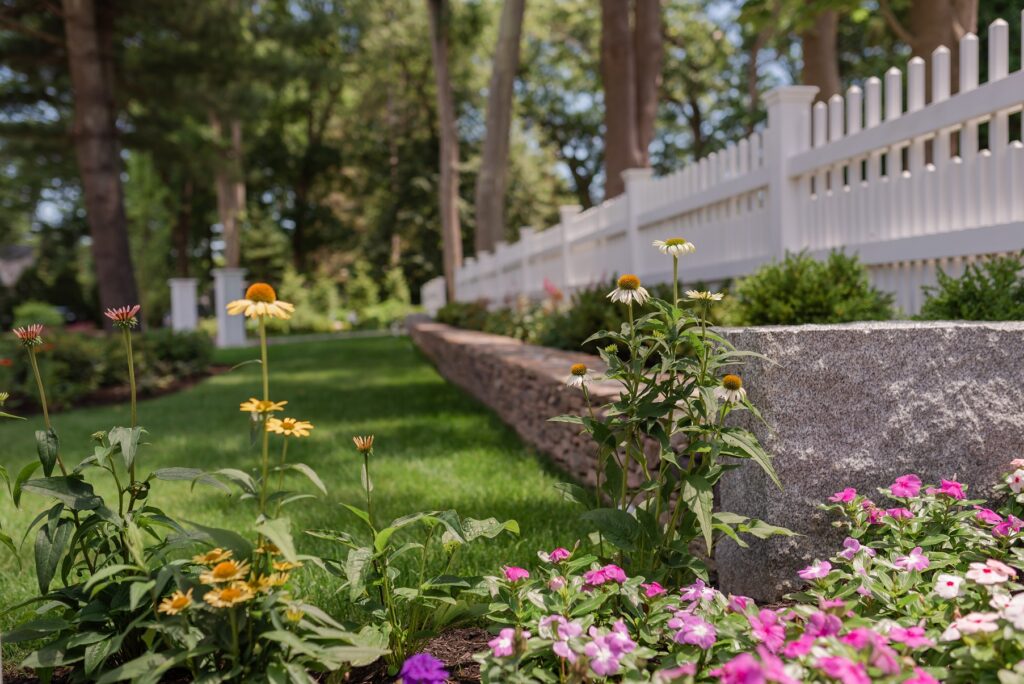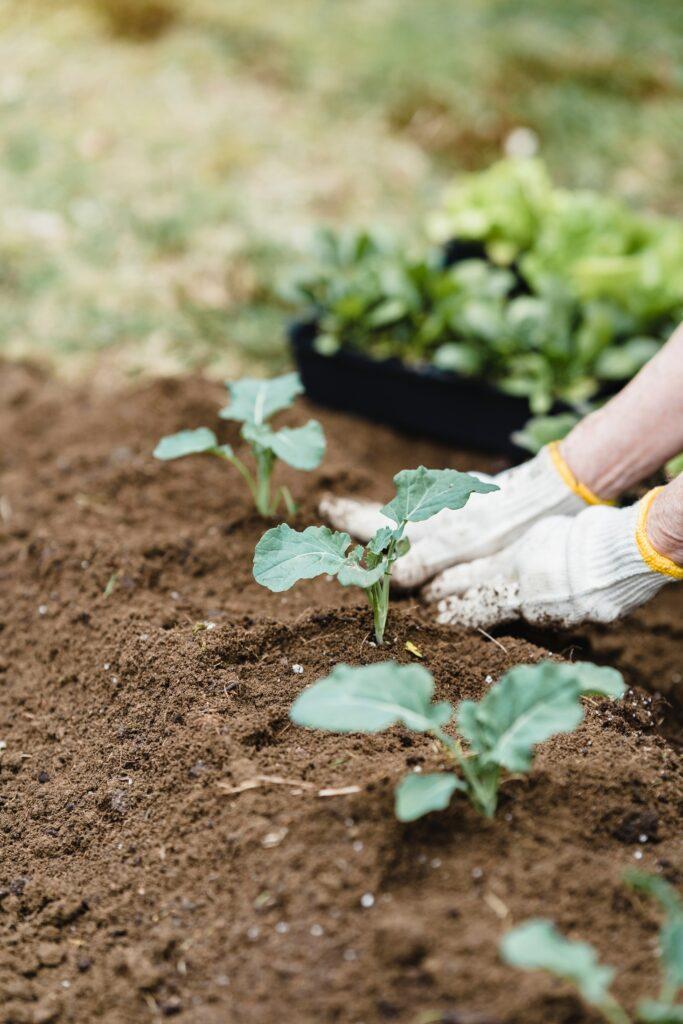Are you looking to Prepare Your Garden For Winter? Consider this a guide for how to protect your plants and prepare the soil for the colder, snowy months in a way that ensures they thrive and flourish when springtime comes.
1. Preparing the garden for winter? First, start with a tidy-up
So, what does cleaning up have to do with winter garden preparation? As with most things in life, first ensuring that you’re working from a clean slate will help ensure that when springtime comes to plant new seeds, you are working with healthy, nutrient-rich soil.
By removing dead plant materials, leaves, stems, and diseased foliage or late blight, you can help prevent the spread of disease and pests that could later contribute to crop failure if untreated.
Ensuring you don’t miss a thing, rake up fallen leaves to prevent mold and fungal spread, but don’t just think surface level. Get your gloves out, grab the shovel, and don’t be afraid to look deeper, uprooting any old bulbs, debris roots, and weeds that could otherwise be the hidden feeding ground for pests during the colder months.
2. Prune back your plants and become a pro at wintering perennials
Perennials are plants that grow back season after season; they often include varieties like peonies and daylilies and require a special kind of attention to really see them thrive year after year.
Around late summer to early fall, stop fertilizing your perennials. Fertilizing too late can promote new growth that may not have enough time to die off before winter. Also, reduce the amount of watering as fall approaches. Adequate hydration helps plants withstand winter stress; however, being sure to water early in the day so that it allows excess moisture to evaporate before temperatures drop is key!
In our opinion, we suggest pruning these kinds of plants back to around 2-3 inches above the ground after the first few frosts toward the end of fall. Ensuring no leaves, shrubs, or foliage is left susceptible to mold, mildew, and disease will help see these plants live long into the future and encourage full growth in the springtime. *Be sure to check what your particular plant variety is, though, as some perennials, especially those covered in seed heads, do better with a springtime pruning rather than fall, so that’s just something to be mindful of.
Trimming back overgrown plants and any damaged branches of shrubs and trees is also super important when preparing a garden for winter.
3. Don’t forget to mulch!
Of course, just like we like to rug up in the colder months, proper garden winter preparation requires providing the soil with some extra love, care, and protection. Apply fresh mulch around any plants that remain in the garden beds to protect their roots from severe dips in temperature and frost.
Organic mulch like straw, leaves, manure, grass clippings, and woodchips are especially helpful and can help keep weeds at bay, as well as drain moisture more efficiently.
PSST… a few other DIY ideas we’ve seen for composting and soil nutrient enrichment include home-brewed compost tea as well, organic bone broth, and more. There are so many incredible ways to help your soil get what it needs. So be sure to do your research and find what works best for you.
4. Winterize your roses
Wondering how to look after your roses when winter sets in? Getting your roses ready for winter is all about giving them the cozy protection they need during the chilly months.
First things first, stop fertilizing by late summer; your roses need to toughen up for dormancy.
Once you’re in late fall, get out your pruners and start trimming. Remove those dead or sickly canes and give the long ones a little haircut while keeping most of that growth intact. Don’t forget to tidy up around the base of the rosebush; we don’t want any debris lying around to invite trouble. Now comes the insulation part – add a nice thick layer of mulch around the base of your rose using materials like straw, wood chips, or even compost.
If you’re in a place with harsh winters, consider building a little protective cage around the rose and fill it with straw, leaves, or pine boughs. Wrap your roses up in burlap or special rose covers to keep them cozy and shielded from winter’s biting winds and snow. Be sure to keep those roses well-watered as winter approaches, but make it an early morning drink to let any extra moisture evaporate.
While winter’s doing its thing, check in on your roses from time to time to make sure everything’s staying put. When spring finally rolls around, and that last frost is a memory, give your roses another trim to clean up any winter damage and clear away any leftover mulch from their base. It’s like giving them a fresh start for a new season, and they’ll reward you with beautiful blooms.
5. Think about next season’s vegetables
As fall approaches, take some time to think about what you’d like to see in your spring garden. Order seeds, bulbs, or any new plants on your wishlist.
Of course, not all gardens are just about aesthetics. If you’re wondering how to prepare a vegetable garden for winter, there are a few more things to consider to make sure your garden soil is the most nutrient-dense and fertile for a future crop.
6. Preparing a vegetable garden for winter? Create your own compost
When preparing garden beds for winter, one of the most powerful supplements you can feed to your soil is a homemade compost… that costs you nothing.
Although it’s easy to get lost in the endless blogs about how to create the perfect compost when preparing the vegetable garden for winter, you also don’t need to overthink it.
In simple terms, a basic compost will be made of four parts: brown, drier, dead leaves, shrubbery, etc, and one part: green, fresh, alive plant material. The browns provide carbon, and the greens provide nitrogen in a way that helps fertilize the soil.
7. Make plant covers for your garden
One of the best ways to prepare a garden for winter includes making and/or installing plant covers.
And the good news is if you consider yourself crafty, DIY-ing your own plant covers is totally an option. First, consider which materials are right for your garden.
Burlap, a breathable material, is perfect for wrapping around your plants and securing them with some twine. If you’re feeling adventurous, you can create mini-greenhouses using clear plastic sheeting stretched over frameworks made from PVC pipes or wooden stakes.
If you have specific plants that need extra care, check out cloches or specialized plant jackets that slip over your shrubs. And, if you enjoy getting your hands dirty, try constructing A-frame tunnels using PVC pipes, rebar, or wooden stakes and drape your chosen covers over them.
Just remember to secure these covers properly, and don’t forget to let your plants bask in the sun when it does make an appearance. Your winter garden will definitely appreciate the extra attention!
8. Protect your water features
Of course, garden preparation for winter isn’t just about the plants. Consider the built structures and features in your garden and how they may be impacted by a shift in climate.
If you have a fountain, pond, or pool, consider installing a heater, installing a quality protective cover, and /or removing the pump to prevent water from freezing and damaging the system.
9. Don’t forget to be practical
Remember the hundreds of dollars you spent on all those nifty garden tools, shovels, pruners, rakes, hoses, and more? Don’t forget to store these away in a dry, tidy space. The last thing you want when it comes to springtime is to find these rusty or damaged from being out in the elements.
And, of course, here are a few more helpful and handy tips:
- Hang any buckets and empty pots upside down so they don’t collect water
- Cover your pile of compost with plastic
- Drain any fuel from your lawn mower and equipment
- Ensure you do your last cut of the grass in the fall as late as possible so that it doesn’t cause brown patches in springtime.
Lastly, a little note on winter weather in our area
Gardening in Massachusetts is all about embracing the ever-changing seasons. Cold winters, gentle springs, sunny summers, and colorful autumns – we really have it all. If you’re closer to the coast, you’ll enjoy milder temperatures thanks to the ocean’s proximity, while further inland, be prepared for chillier winters and hotter summers. When it comes to rain, the Bay State keeps it interesting with a consistent dose year-round. But don’t forget about the snow in winter – it can pile up! And for gardeners, late spring frosts can be a bit of a curveball.
Nonetheless, this climate offers a wide range of gardening opportunities, from hardy perennials that tough out the cold to those vibrant summer blooms and crops that soak up the sun. To thrive in Massachusetts, you’ve got to know your climate and adjust your gardening game as the seasons shift.
So there you have it. An easy yet detailed guide on how to prepare your garden for winter. Do you feel like winter is coming around all too quickly? Need a hand with getting your garden ready for the winter and primed for a prosperous springtime? Contact The Patio Company today.











Follow Us